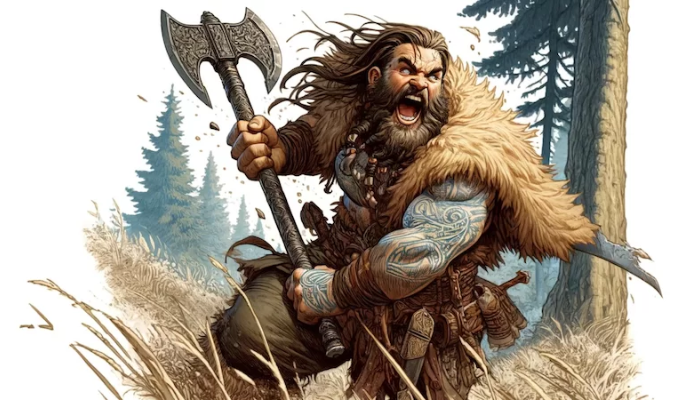The world of Dungeons & Dragons (DnD) offers a vast array of character backgrounds, each granting unique abilities, skills, and a compelling backstory. Among these, the DnD Outlander is a standout option for those who seek adventure outside the confines of cities and towns. Whether you want to play a rugged survivor of the wilderness or a wandering nomad with ties to a distant culture, the Outlander background allows for rich role-playing opportunities. In this article, we’ll delve deep into the features of the DnD Outlander, providing you with a comprehensive guide to making the most of this background choice for your next character.
What is the DnD Outlander Background?
The DnD Outlander background is one of the 13 official backgrounds available in Dungeons & Dragons 5e, often chosen by players who want their characters to have a deep connection to nature and the wild. As an Outlander, your character has likely spent a considerable amount of time in the wilderness, away from the safety of civilization. This could mean living as a hunter, a nomad, or even an exile. This background emphasizes survival skills, deep knowledge of the land, and an independent lifestyle.
An Outlander’s primary traits include proficiency in skills like Athletics, Survival, and sometimes Nature, reflecting their experience in harsh environments. The Outlander is a versatile background, often associated with ranger-like qualities, though it can be adapted to suit any class. Whether you’re crafting a barbarian who thrives on primal instincts or a druid seeking to immerse themselves in nature, the Outlander background can add depth to your character’s story.
Key Features and Abilities of the DnD Outlander
One of the standout features of the DnD Outlander background is the “Wanderer” trait. This grants your character the ability to find food and fresh water for themselves and up to five others, provided they are in the wilderness. This ability highlights your character’s survival skills and reinforces the Outlander’s deep connection to the natural world. This practical feature can be crucial for adventuring parties that find themselves in remote areas, as it can help save resources and keep the party sustained without relying on local settlements.
In addition to Wanderer, Outlanders gain proficiency in two key skills: Survival and Athletics. Survival is vital for anyone living off the land, allowing your character to track creatures, navigate through difficult terrain, and identify signs of danger in the wilderness. Athletics, on the other hand, boosts physical strength and endurance, enhancing your character’s ability to climb, swim, or fight in harsh conditions. These skills complement each other and enable Outlanders to thrive in settings where others might struggle.
Outlander Personality Traits, Ideals, Bonds, and Flaws
When creating a DnD Outlander character, you also get to choose specific personality traits, ideals, bonds, and flaws that define your character’s backstory and motivations. These elements add richness to the character, helping you role-play their actions and decisions.
Personality Traits: Outlanders often exhibit personality traits that reflect their time spent away from civilization. For instance, they might be reserved, solitary, or skeptical of others. Some Outlanders may have an intense love for the wilderness, while others might show a hardened demeanor due to their struggles in the wild.
Ideals: The Outlander’s ideals tend to align with self-sufficiency and freedom. Your character may value independence above all else or have a strong connection to the natural world. Many Outlanders are driven by ideals of survival, freedom, or the belief that civilization is corrupt or stifling.
Bonds: Outlanders often have strong bonds with the natural world or other individuals they’ve shared their survival journey with. For example, an Outlander might be committed to protecting a specific forest or animal species, or they could be tied to a nomadic tribe or community.
Flaws: With their rough upbringing and experiences in the wilderness, Outlanders may carry flaws like distrust of others, difficulty adapting to social situations, or an overconfidence in their survival skills that can lead them into danger.
Roleplaying as a DnD Outlander: Tips and Ideas
Roleplaying as a DnD Outlander offers a wealth of creative opportunities. The background provides a foundation for crafting a character that is deeply connected to the natural world, and it allows for interesting interactions with more urban or refined characters. Here are some tips to help you roleplay your Outlander character effectively:
- Embrace the Wilderness: Make sure your character’s connection to the wild is evident in how they interact with the environment. Perhaps they find peace in the forest or are constantly scouting for danger in their surroundings. Their ability to adapt to and thrive in the wilderness can be a defining trait in your roleplaying.
- Social Challenges: Since Outlanders often have little experience with or interest in urban life, this can create a dynamic roleplaying challenge. Your character might struggle with city customs, etiquette, or understanding complex social hierarchies. Use this as an opportunity to bring humor and depth to interactions with NPCs or other players.
- Personal Motivation: Every Outlander has their unique reason for living in the wild or for leaving civilization behind. Perhaps your character is a former soldier who seeks redemption, or they are driven by the need to protect the environment. Having a personal motivation will guide your character’s actions and make them more compelling to roleplay.
Combining the DnD Outlander with Other Classes
While the DnD Outlander background is versatile, it pairs particularly well with certain classes that benefit from wilderness survival and combat skills. Here are a few combinations that work well:
- Ranger: The Ranger class is the quintessential partner for the Outlander background. Both the Outlander and Ranger share an affinity for the wild, survival skills, and natural magic. If you choose this combination, your character will excel in exploration, tracking, and combat in nature-filled environments.
- Barbarian: The rugged, primal nature of the Barbarian fits perfectly with the Outlander’s skills. With a Barbarian’s rage and the Outlander’s survival instincts, you’ll create a powerful character who thrives in dangerous and untamed environments.
- Druid: A Druid who has spent their life in the wild will find common ground with the Outlander. This combination makes for a character who is in tune with nature, capable of shaping the world around them through magic while using their wilderness knowledge to survive.
- Monk: The Monk’s discipline and self-reliance can complement the Outlander’s survival expertise. A Monk who hails from a remote monastery or village may have the skills to survive in isolation and still come out victorious in battle.
Conclusion
The DnD Outlander background is a fantastic choice for players who want to immerse their characters in the wilderness, offering an array of survival skills, deep ties to nature, and role-playing potential. Whether you’re looking to play a lone wanderer, a forest protector, or a battle-hardened survivor, this background provides the foundation for a rich and dynamic character. By combining the Outlander with other classes and customizing your backstory, you can create a compelling character ready to thrive in even the most remote corners of the Dungeons & Dragons world.
FAQs
1. What does the DnD Outlander background give you? The Outlander background provides proficiency in Survival and Athletics, the Wanderer trait for finding food and water, and a set of personality traits, ideals, bonds, and flaws to shape your character’s story.
2. What classes work best with the DnD Outlander? The Outlander background pairs well with classes like Ranger, Barbarian, Druid, and Monk, as they all share a connection to the wilderness and survival skills.
3. Can an Outlander character be a city dweller? While Outlanders are typically tied to the wilderness, your character could be an urbanite who has chosen to leave the city for a life of adventure. This contrast can add interesting roleplaying challenges.
4. What are some good roleplay ideas for an Outlander? An Outlander might struggle in social settings, distrust urban dwellers, or act as a protector of the wilderness. Emphasizing your character’s independence and connection to nature can provide great roleplay moments.
5. Can an Outlander become a leader of a tribe or community? Yes, an Outlander could be the leader of a nomadic tribe or have strong bonds with their community, depending on their backstory. This could be an important part of their motivation.
6. How does the Wanderer trait affect gameplay? The Wanderer trait allows your character to find food and water for themselves and others when traveling in the wilderness. This can be a crucial survival tool during long journeys or in hostile environments.
7. Do Outlanders have any magical abilities? Outlanders do not inherently have magical abilities, but their connection to nature makes them a good fit for spellcasting classes like Druid or Ranger, which can unlock magical powers.
8. Can Outlanders survive in any environment? Outlanders excel in wilderness environments, particularly forests, mountains, and deserts. However, they may struggle in more urban settings where their survival skills are less applicable.
9. What are the main flaws of the Outlander background? Outlanders might struggle with social interactions, show distrust towards others, or overestimate their survival





